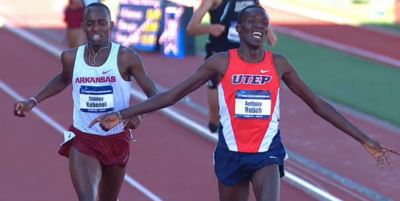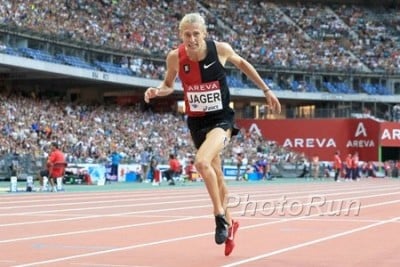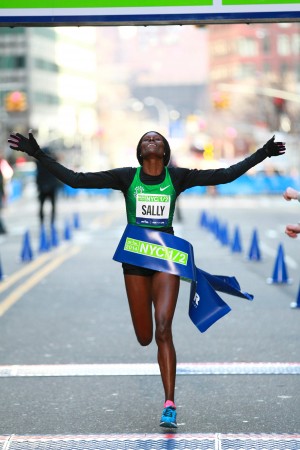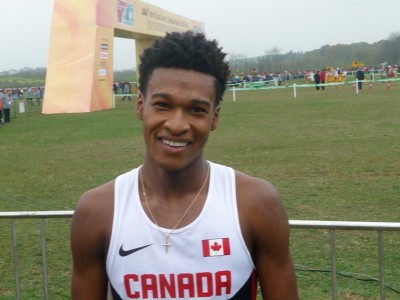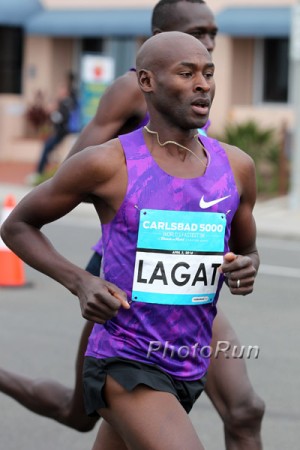2016 Payton Jordan Preview: Bernard Lagat’s 10,000 Debut, Evan Jager In The 1,500 & An NCAA Preview In The 5,000
By LetsRun.com
April 29, 2016
It’s the first weekend in May, and that means one thing: distance runners from around the world flocking to the ideal running conditions of Palo Alto, Calif., for the Payton Jordan Invitational at Stanford University. In all, last year’s meet saw 57 athletes notch World Championship qualifiers and with Payton Jordan representing the best chance for many athletes to hit the Olympic standard, the fields are loaded once again. Watching the meet may require a few East Coasters to stay up past their bedtimes on a Sunday night (the final event, heat 2 of the women’s 10,000, will wrap up around 2:30 a.m. Monday morning) but the top races should be worth it.
Here’s a sampling of the top stars entered: Courtney Frerichs (steeple), Andy Bayer (steeple), Matt Hughes (steeple), Maggie Vessey (800), Cory McGee (1,500), Shelby Houlihan (1,500), Henrik Ingebrigtsen (1,500), Evan Jager (1,500), Sally Kipyego (5k), Nicole Tully (5k), Garrett Heath (5k), Chris Derrick (5k), Buze Diriba (10k), Molly Seidel (10k), Sam Chelanga (10k) and last but not least, the 10k debut of the great Bernard Lagat.
We break down the top events below in chronological order.
With the exception of Jager, America’s top stars are sitting this one out this year, but there are some very interesting races. The highlights in our book for the men are the 1500 (Jager vs. Ingebrigtsen) and Lagat’s 10k debut, plus the men’s 5k could be a preview of NCAAs minus Edward Cheserek. On the women’s side, the 10k has some interesting story lines with the debut of Marielle Hall, the return of Jordan Hasay, plus Kim Smith, and Molly Seidel, not to mention the women’s 5k led by Sally Kipyego.
What: 2016 Payton Jordan Invitational
Where: Cobb Track and Angell Field, Palo Alto, Calif.
When: Sunday, May 1, 2016
How to watch: Live on Flotrack Pro (requires subscription)
Entries * Heat sheets * Schedule * Live results
Women’s 3000 Steeplechase (Section #1 at 8:11 p.m. ET)
Olympic standard: 9:45.00; U.S. Olympic Trials standard: 9:53.00
Women to watch (women in bold have Olympic standard)
| Name | Country (School) | PB | Comment |
| Courtney Frerichs | USA (UNM) | 9:31.36 | NCAA runner-up was 7th at USAs in ’15 |
| Marisa Howard | USA | 9:37.84 | Boise St. grad was 4th at NCAAs in ’15 |
| Rachel Johnson | USA (Baylor) | 9:41.56 | 9th at USAs in ’15 |
| Shalaya Kipp | USA | 9:35.73 | ’12 Olympian was 3rd at USA Indoors in 3k |
| Sarah Pease | USA | 9:46.66 | 10th at USAs in ’15 |
| Lennie Waite | Great Britain | 9:40.39 | ’15 UK champ |
| Muriel Coneo Paredes | Colombia | 9:43.16 | Followed up 10-sec PB at Mt. SAC w/ national titles in 1500/5k |
| Genevieve Lalonde | Canada | 9:35.69 | 2nd at Canadian champs in ’15 |
| Jamie Cheever | USA | 9:29.13 | 12th at USAs in ’15 |
Almost all of the top entrants in this field already own the Olympic standard, leaving them free to chase a really fast time (should they desire) at Stanford. Aussie Madeline Hills‘ world leader of 9:34.44 is there for the taking. New Mexico’s Courtney Frerichs won here last year in 9:32.12 (though she was still running for UMKC at the time) and currently ranks as the fourth-fastest steepler in NCAA history (making her the heavy favorite for her first NCAA individual title). Frerichs, who was fourth at NCAA XC in November, was out of eligibility indoors but opened up outdoors with a 1500 pb of 4:18.92 on April 15 — almost four seconds faster than what she ran at the same meet a year ago. She is the favorite here and has a great chance to join Jenny Simpson and Emma Coburn as the only collegians to break 9:30.
Colombia’s Muriel Coneo Paredes has the fastest time this year among entrants (she ran 9:43.16 to win at Mt. SAC) but Frerichs’ toughest competition could come from Shalaya Kipp, who trains with Simpson and Coburn in Boulder. Kipp represented Team USA in the steeple at the 2012 Olympics and 2013 Worlds and is coming off a strong run at USA Indoors, where she placed third in the 3000. Kipp hasn’t PR’d since the Olympic Trials final almost four years ago but she came on strong at the end of last season (silvers at Pan Ams and NACACs) and looks as if she’s carried that momentum into 2016.
Men’s 3000 Steeplechase (Section #1 at 8:39 p.m. ET)
Olympic standard: 8:30.00; U.S. Olympic Trials standard: 8:32.00
Men to watch (men in bold have Olympic standard)
| Name | Country (School) | PB | Comment |
| Andy Bayer | USA | 8:18.08 | 4th at USAs last year |
| Hillary Bor | USA | 8:30.70 | Won steeple at Stanford Invite |
| Mason Ferlic | USA (Michigan) | 8:33.95 | Coming off pbs in steeple/5k |
| Craig Forys | USA | 8:24.09 | 9th at USAs last year |
| Alex Genest | Canada | 8:19.33 | Canadian runner-up in ’15 |
| Matt Hughes | Canada | 8:11.64 | 8th at Worlds last year |
| Stanley Kebenei | USA | 8:23.93 | 5th at USAs in ’15 |
| Taylor Milne | Canada | 8:19.90 | 3rd at ’15 Canadian champs |
| Anthony Rotich | Kenya | 8:21.19 | 3-time NCAA champ is now a pro |
| Tabor Stevens | USA | 8:26.81 | 7th at USAs in ’15 |
Kebenei took the win here last year in 8:23.93, and he’s among the top contenders in 2016. Based on their 2015 seasons, Bowerman Track Club Andy Bayer (4th at USAs, ran 8:21 or faster three times) and Matt Hughes (8th at Worlds) are the top two guys in the field, and Bayer showed himself to be in good shape indoors, clocking a quick 7:42.33 pb over 3,000 meters at Millrose. This will be the outdoor opener for many of the pros, including Bayer, Hughes, Tabor Stevens and Craig Forys, so we’ll get a look at how steeple-ready they are right now.
Two 2015 college grads should also be compelling. Kenyan Anthony Rotich won three straight NCAA titles at UTEP but has exhausted his eligibility. He’s a great championship racer, but a time-trial type effort like this may not suit him: his season bests have gotten slower in each of the past two years, from 8:21 in 2013 to 8:30 in 2014 to 8:33 last year.
As a pro, Rotich will need fast times to make a living, so a potentially fast race such as Payton Jordan may be what he needs to finally break 8:20. Stanley Kebenei is the man Rotich denied the past two years at NCAAs, and he opened his track season with a 4:05 mile last weekend in Berkeley. That may not sound like much, but Kebenei could be a lot stronger than in 2015 as he impressively won the U.S. 15K champs in Jacksonville last month over long-distance specialists Shadrack Kipchirchir and Christo Landry. Can Kebenei translate that success to the steeple?
Women’s 800 (Section #1 at 8:56 p.m. ET)
Olympic standard: 2:01.50; U.S. Olympic Trials standard: 2:03.00
Heat 1 (women in bold have Olympic standard)
| Name | Country (School) | PB | Comment |
| Chrishuna Williams | USA | 2:01.61 | Ran 2:02 at Texas 2 weeks ago |
| Olivia Baker | USA (Stanford) | 2:04.00 | 3rd at NCAA Indoors |
| Hanna Green | USA (Virginia Tech) | 2:01.17 | 2nd at NCAA Indoors |
| Claudia Saunders | USA (Stanford) | 2:00.63 | NCAA runner-up outdoors in ’14 and ’15 |
| Maggie Vessey | USA | 1:57.84 | 34-year-old was 8th at USAs last year |
| Justine Fedronic | France | 2:00.41 | |
| Dana Mecke | USA | 2:00.76 | 7th at USAs last year |
| Katie Mackey | USA | 2:01.20 | 1500/5k runner stepping down |
| Megan Malasarte | USA | 2:02.06 |
Though NCAA indoor/outdoor champ Raevyn Rogers is absent (she ran at Penn instead), several of the NCAA’s top 800 women are here, including the second and third placers at NCAA indoors (Hanna Green and Olivia Baker) plus Stanford’s Claudia Saunders, who was second here last year and has finished second at NCAAs in each of the past two years. Arkansas grad Chrishuna Williams won this race in 2015 and has already run 2:02.61 in 2016, but that’s only the third-best SB in the field behind Dana Mecke (2:02.20) and Maggie Vessey (2:02.18). Even at 34, we like Vessey to prevail against this field; she’s the only one to have broken 2:00 in her career, and though she hasn’t done it since May 2014, she did run 2:00 six times last year.
Nineteen-year-old Alexa Efraimson, who was sixth at USA Indoors in the 1500, will run in heat two.
Men’s 800 (Section #1 at 9:05 p.m. ET)
Olympic standard: 1:46.00; U.S. Olympic Trials standard: 1:46.00
Heat 1 (men in bold have Olympic standard)
| Name | Country (School) | PB | Comment |
| Declan Murray | Ireland | 1:46.77 | |
| Jake Burton | USA (Florida St.) | 1:47.72 | ACC indoor runner-up |
| Craig Engels | USA (Ole Miss) | 1:46.13 | Helped Ole Miss to 3rd in NCAA DMR |
| Eliud Rutto | Kenya (Mid. Tenn. St.) | 1:45.37 | NCAA indoor runner-up was second behind D. Solomon at Mt. SAC in 1:45.59 |
| Jesse Jorgensen | USA | 1:45.67 | USA semifinalist in ’15 |
| Guy Learmonth | Great Britain | 1:46.65 | 3rd at UK Indoor champs |
| Chris Low | USA | 1:47.21 |
There aren’t many big names here. The most interesting athlete is Middle Tennessee State’s Eliud Rutto, who has been enjoying a resurgent 2016 season. Rutto broke out at this meet two years ago by running 1:45.37, the fastest time of the night, but he hadn’t broken 1:47 since then until he ran 1:45 at Mt. SAC two weeks ago. His run at Mt. SAC wasn’t entirely surprising, however, as he was second in a loaded 800 at NCAA Indoors, losing only to Akron’s Clayton Murphy. Given how strong the two-lap distance is in the NCAA this year, it will likely require a 1:44-type effort to win NCAAs. One collegian (BYU’s Shaquille Murphy) has already broken 1:45 this year; can Rutto (who has the #2 time behind Walker) make it two?
Women’s 1500 (Section #1 at 10:34 p.m. ET)
Olympic standard: 4:07.00; U.S. Olympic Trials standard: 4:09.50
Heat 1 (women in bold have Olympic standard)
| Name | Country (School) | PB | Comment |
| Lauren Johnson | USA | 4:04.17 | 4th placer at USAs last year, WC semifinalist |
| Nikki Hamblin | New Zealand | 4:04.82 | |
| Cory McGee | USA | 4:06.67 | 2nd at USA Indoors |
| Gabriela Stafford | Canada | 4:07.44 | Silver at World University Games last year |
| Muriel Coneo Paredes | Colombia | 4:08.31 | Also entered in steeple |
| Kate Van Buskirk | Canada | 4:05.38 | Commonwealth Games bronze medallist in ’14 |
| Morgan Uceny | USA | 4:00.06 | Ran 4:27 mile indoors |
| Shelby Houlihan | USA | 4:09.62 | ’14 NCAA champ ran quick 15:06 5k indoors |
| Melissa Courtney | Great Britain | 4:09.74 | |
| Linden Hall | Australia | 4:10.41 | Runner-up at Aussie champs needs standard |
| Hilary Stallingwerff | Canada | 4:05.08 | |
| Greta Feldman | USA | 4:12.29 | |
| Morgan Mosby | USA | 4:19.60 |
This race should be moderately fast as only two women in the top heat — American Lauren Johnson and Kiwi Nikki Hamblin have the 4:07.00 Olympic standard. One woman who should have a good shot at it is Cory McGee. McGee, who made Worlds as a junior at Florida in 2013, was second at USA Indoors (she went out in the prelims at World Indoors). Given that McGee ran 4:09 in a championship race at USA Indoors, she should be able to knock a couple seconds off that if she’s still fit outdoors.
Among international entrants, Australian Florida State grad Linden Hall will be feeling the pressure. She was second at the Australian Championships earlier this month but her 4:10.41 pb is over three seconds off the Rio standard. She still has some time to hit the mark and earn selection, but she may have to wait a little longer. Over the past years, the fastest women’s 1500 times at Payton Jordan have been as follows: 4:12.49, 4:07.35, 4:06.40, 4:07.00, 4:08.95, 4:08.11. That’s right; only one woman has broken 4:07 at Payton Jordan over the last five years. It’s not a knock on the meet, rather recognition that May 1 is still early in the outdoor season and most athletes have not come close to peaking yet.
Heat 2 (which goes off seven minutes before heat 1 at 10:26 p.m. ET) should also be exciting as 800 specialists Phoebe Wright and Laura Roesler are entered. Shalaya Kipp is also entered in heat 2 and it’s possible she runs this rather than the steeple (in which she is also entered) as she already has the Olympic standard in the steeple.
Men’s 1500 (Section #1 at 10:47 p.m. ET)
Olympic standard: 3:36.20; U.S. Olympic Trials standard: 3:38.00
Heat 1 (men in bold have Olympic standard)
| Name | Country (School) | PB | Comment |
| Henrik Ingebrigtsen | Norway | 3:31.46 | 5th at ’12 Olympics |
| Evan Jager | USA | 3:32.97 | 7th at USA indoors in 3k; outdoor opener |
| Lopez Lomong | USA | 3:32.20 | Struggled in ’15; 1:48 two weeks ago at Mt. SAC |
| Bryan Cantero | France | 3:36.08 | |
| Colby Alexander | USA | 3:36.56 | 6th at USA Indoors |
| Ford Palmer | USA | 3:36.98 | Opened up with 1:49.81 800 last week at Princeton |
| Jeremy Rae | Canada | 3:36.85 | 2016 opener for former Notre Dame star |
| Blake Haney | USA (Oregon) | 3:40.09 | 2nd at NCAA Indoors |
| Dan Huling | USA | 3:37.53 | Capped strong ’15 with 5th at Worlds in steeple |
| John Gregorek | USA | 3:40.89 | |
| Izaic Yorks | USA (Washington) | 3:41.56 | In line for big pb after running 3:53 mile indoors |
This is one of the marquee events of the night, with Olympic fifth placer Henrik Ingebrigtsen taking on several top North American pros, including Bowerman Track Club’s Evan Jager, Lopez Lomong and Dan Huling. Jager is the biggest name, and though replicating his blazing 3:32 from last summer is unlikely, he showed he was fit indoors (7:40 indoor 3k PB in February) still has a good shot at the win.
Here’s a look at Jager’s 1500 SBs since turning pro in 2009:
2009: 3:38.33
2010: 3:38.53
2011: 3:38.80
2012: 3:40.72
2013: 3:36.34
2014: 3:39.68
2015: 3:32.97
Ford Palmer actually beat Jager in this race last year (Ryan Hill was 1st with Palmer 2nd and Jager 3rd), so he’ll be worth monitoring, as will Ingebrigtsen, who will be looking to rebound from a down year that saw him go out in the first round at Worlds.
There should also be a good battle between collegians and Pac-12 rivals Blake Haney of Oregon and Izaic Yorks of Washington (Haney’s teammate Edward Cheserek was also entered initially but mysteriously scratched). Haney was 2nd in the mile at NCAAs and ran 3:56 indoors, but Yorks has the advantage. He beat Haney badly on Haney’s home track three weeks ago in Eugene and ran an NCAA-leading 3:53.89 mile indoors. That converts to about a 3:36 1500; could Yorks become just the sixth collegian to break 3:36?
All-time fastest collegians at 1500 (per Track & Field News; marks achieved during NCAA season)
1. Sydney Maree, Villanova 3:35.30 (1981)
2. Kyle Merber, Columbia 3:35.59 (2012)
3. Abdi Bile, George Mason 3:35.79 (1987)
4. Joe Falcon, Arkansas 3:35.84 (1988)
4. Brian Hyde, William & Mary 3:35.84 (1995)
Other entrants of note include Daniel Winn (7th at USAs last year) and two-time British Olympian Michael Rimmer in heat 2 (10:40 p.m. ET); German Fernandez (also entered in 5,000), Oregon’s Matthew Maton and Oklahoma’s Jacob Burcham in heat 3 (7:45 p.m. ET) and Diego Estrada in heat 5 (7:19 p.m. ET).
Women’s 5000 (Section #1 at 11:34 p.m. ET)
Olympic standard: 15:24.00; U.S. Olympic Trials standard: 15:25.00
Heat 1 (women in bold have Olympic standard)
| Name | Country (School) | PB | Comment |
| Maren Kock | Germany | 15:22.75 | |
| Sally Kipyego | Kenya | 14:30.42 | Olympic silver medallist in 10k; 5th at Worlds in 10k in ’15 |
| Nicole Tully | USA | 15:05.58 | ’15 US champ was 13th at Worlds last year |
| Jessica O’Connell | Canada | 15:06.44 | |
| Maureen Koster | The Netherlands | 15:07.73 | 4th at World Indoors in 3k |
| Kim Conley | USA | 15:08.61 | Missed most of ’15 due to injury but ran 15:09 indoors |
| Jen Rhines | USA | 14:54.29 | Made Team USA in XC last year at age 40 |
| Emily Sisson | USA | 15:12.22 | ’15 NCAA indoor/outdoor champ |
| Misaki Onishi | Japan | 15:16.82 | |
| Alisha Williams | USA | 15:09.73 | |
| Stephanie Garcia | USA | 15:19.50 | Ran 5k pb here last year and has only improved since |
| Brie Felnagle | USA | 15:14.33 | |
| Katrina Coogan | USA (Georgetown) | 15:34.34 | Unlikely to run here considering she also ran at Penn |
| Lauren Paquette | USA | 15:20.44 | 2016 outdoor world leader after win at Mt. SAC |
| Laura Whittle | Great Britain | 15:20.92 | |
| Amy Van Alstine | USA | 15:22.98 | |
| Kate Avery | Great Britain | 15:25.63 | 2014 NCAA champ at Iona |
| Rochelle Kanuho | USA | 15:25.85 | |
| Liv Westphal | France (Boston College) | 15:28.71 | |
| Calli Thackery | Great Britain (UNM) | 15:42.57 |
With a pb over 20 seconds faster than anyone else in the field, the Oregon Track Club’s Sally Kipyego is the favorite on paper, but she is something of an unknown quantity given that she was training for a marathon last fall (she DNF’d New York) and didn’t race at all indoors. Still, she was fifth at Worlds in the 10,000 just eight months ago, and won here last year, so she should be among the leaders on Sunday. The woman who’s been in the best form in 2016 is the Netherlands’ Maureen Koster, who ran 4:10 and 8:49 indoors before taking 4th at World Indoors in the 3000. Steepler Stephanie Garcia (who was 9th at Worlds last year) ran 15:19 here last year and ran a mile pb (4:28.47) during an abbreviated indoor season.
2015 U.S. champ Nicole Tully was third last year in her 5,000 debut and opened up last week in a solid 4:10 for 1500. Canada’s Jessica O’Connell (9th in World Indoors 3k) and Emily Sisson (5th in B.A.A. 5K on April 16 in 15:45) are among the top women running their first outdoor track races of 2016. American Lauren Paquette ran 15:20 to win her 5,000 debut at Mt. SAC by 10 seconds two weeks ago; she could go even faster with the improved competition at Stanford. Finally, 2012 Olympian Kim Conley should be firmly in the hunt up front. Conley won her first U.S. title in 2014 at 10,000 meters and was set for an even better 2015, winning the U.S. Half Marathon Champs in January before an injury shuttered her track season. Conley already blitzed a 15:09 5k indoors in January and could go even faster here.
Top entrants in heat 2 (10:52 p.m. ET) include Gabe Grunewald, Laura Thweatt and Elise Cranny (5,000 debut).
Men’s 5,000 (Section #1 at 11:54 p.m. ET)
Olympic standard: 13:25.00; U.S. Olympic Trials standard: 13:28.00
Heat 1 (men in bold have Olympic standard)
| Name | Country (School) | PB | Comment |
| Sindre Buraas | Norway | 13:11.96 | |
| Garrett Heath | USA | 13:16.31 | 4th at USAs last year |
| Patrick Tiernan | Australia (Villanova) | 13:31.25 | NCAA XC runner-up was 4th at last month’s Aussie champs |
| Chris Derrick | USA | 13:08.04 | Has battled injuries last 2 years but still ran 7:43/13:19 last summer |
| Donn Cabral | USA | 13:22.19 | 10th at Worlds in steeple last year |
| Leonard Korir | USA | 13:15.45 | Newly naturalized citizen ran 27:58 to win Stanford Invite 10k |
| Sean McGorty | USA (Stanford) | 13:37.64 | NCAA 3k runner-up behind Edward Cheserek |
| Kemoy Campbell | Jamaica | 13:20.39 | Already on Jamaican Olympic team thanks to 13:20 last year |
| Jeff See | USA | 13:21.16 | |
| Dennis Licht | The Netherlands | 13:23.00 | |
| Mogan McDonald | Australia (Wisconsin) | 14:01.23 | 7:52 3k performer should smash pb |
| Justyn Knight | Canada (Syracuse) | 13:34.86 | Stellar so far in ’15-’16; can he get Olympic standard? |
| Cristian Soratos | USA | 14:30.35 | First serious 5k for 1500 specialist |
| Trevor Dunbar | USA | 13:26.90 | |
| Thomas Curtin | USA (Virginia Tech) | 13:37.10 | 2nd at NCAA Indoors behind Edward Cheserek |
| Andrew Butchart | Great Britain | 13:29.49 | |
| Florian Orth | Germany | 13:29.63 | |
| David Torrence | USA | 13:16.53 | 5th at USAs last year |
| Reed Connor | USA | 13:32.23 | |
| Sam McEntee | Australia | 13:33.73 | Aussie champ needs Olympic standard to go to Rio |
| Stephen Sambu | Kenya | 13:13.74 | 3rd in B.A.A. 5K on April 16 |
Though the very best U.S. pros (Ryan Hill, Galen Rupp, Ben True) aren’t running here, there are several big names in both the professional and collegiate ranks. Garrett Heath and David Torrence narrowly missed making their first World Championship teams last year, taking fourth and fifth at USAs last year, and Heath is the top returner from this race last year, running his PR of 13:16 to place second. Heath looked good indoors, taking 5th at USAs in the 3k, and is among the favorites in this race. Other top pros such as Chris Derrick (racing for the first time since January 3), Donn Cabral and new U.S. citizen Leonard Korir of the Army’s WCAP program (who ran 27:58 at the first Stanford meet) should also be near the front of the pack, as should Kenya’s Stephen Sambu, who ran 13:44 on the roads two weeks ago.
This race will also be important for two men chasing the Olympic standard: Justyn Knight of Canada and Syracuse and Villanova grad Sam McEntee of Australia. McEntee won the Aussie champs earlier this month but still needs to hit the 13:25.00 standard to punch his ticket to Rio. With only Mo Ahmed and Cam Levins likely ahead of him among Canadians, Knight will have a great shot to make the Olympics if he hits the time as well (though Ross Proudfoot, in heat 2 here, ran 13:29 last year).
Knight is one of several high-profile collegians entered here. And with Edward Cheserek’s status up in the air (he scratched from the 1500 at Stanford), this could serve as an NCAA preview. NCAA XC runner-up Patrick Tiernan, NCAA 3,000 runner-up Sean McGorty and NCAA indoor 5,000 runner-up Thomas Curtin have all been denied NCAA titles by King Ches this year and are all entered in the Payton Jordan 5,000. Will one of them be able to break through and win one in June?
Top entrants in heat 2 (11:12 p.m. ET) include Cory Leslie, Shadrack Kipchirchir, Tulsa’s Marc Scott and Stanford’s Grant Fisher (5,000 debut).
Women’s 10,000 (Section #1 at 12:12 a.m. ET)
Olympic standard: 32:15.00; U.S. Olympic Trials standard: 32:25.00; 2017 Worlds standard: 32:15.00
Women to watch (women in bold have Olympic standard)
| Name | Country (School) | PB | Comment |
| Irene Cheptai | Kenya | debut | 7th at World XC and Worlds 5,000 in ’15 |
| Kim Smith | New Zealand | 30:35.54 | 3-time Olympian ran 15:32 at Stanford Invite in 1st track race since ’13 |
| Buze Diriba | Ethiopia | 31:33.27 | 2nd to Molly Huddle in BAA 5K (15:28) |
| Jordan Hasay | USA | 31:39.67 | Hasn’t regained pre-injury form yet but was 2nd at USAs in ’13 and ’14 |
| Caroline Chepkoech | Kenya | debut | 3rd in BAA 5K, 2nd in Carlsbad 5000 |
| Diane Nukuri | Burundi | 32:45.96 | 1st outdoor track race since ’12 but has blossomed on roads since then |
| Marielle Hall | USA | debut | 2nd at USAs in 5k last year |
| Kellyn Taylor | USA | 32:29.88 | 6th at Olympic Marathon Trials in Feb. |
| Liz Costello | USA | 32:01.79 | 7th at USAs last year |
| Alexi Pappas | Greece | 32:02.22 | Dartmouth/Oregon grad ran 32:02 last year but must hit Olympic standard again to run for Greece in Rio |
| Dominique Scott | South Africa (Arkansas) | 32:11.60 | Runner-up in SA champs 1500 on April 16 |
| Erin Finn | USA (Michigan) | 32:41.65 | Runner-up in NCAA 3k, 5k |
| Alice Wright | Great Britain (UNM) | 32:46.57 | 5th at NCAA XC |
| Molly Seidel | USA (Notre Dame) | 33:18.57 | Has dominated NCAA this year and should crush pb |
| Riko Matzusaki | Japan | 31:44.86 | |
| Lanni Marchant | Canada | 31:46.94 | 20th at World Half Champs last month |
| Gladys Tejeda | Peru | 32:18.49 | Drug cheat was 9th at World Half Champs |
Three young Africans, two of whom are making their 10,000 debuts, headline this field. Kenya’s Irene Cheptai, 24, was 7th at World XC and 7th in the 5,000 at Worlds last year; she’ll make her debut alongside 21-year-old countrywoman Caroline Chepkoech (4th in World XC junior race in ’13), who was second behind Meseret Defar at the Carlsbad 5000 earlier this month. Buze Diriba, 22, of Ethiopia, ran 31:33 to take second here in 2015. She’d make most national teams and was 5th in the 5,000 at Worlds in 2013, but with runners such as Genzebe Dibaba, Almaz Ayana, Senbere Teferi and Meseret Defar blocking her way, she’ll need to make a big leap to make this summer’s Olympics.
There will be a race-within-a-race for top American honors, with several intriguing names. Jordan Hasay did not resemble her old self this year indoors, but a couple more months may allow her to regain her 2013-2014 form, where she was second in the 10,000 at USAs both years. Kellyn Taylor will look to bounce back from 6th at the Olympic Marathon Trials by making the Rio team on the track (she was 7th at USAs in the 5k last year) and there’s a debut for 2015 USA 5k runner-up Marielle Hall.
2. Sally Kipyego, Texas Tech 31:25.45 (2008)
3. Betsy Saina, Iowa State 31:37.22 (2013)
4. Emily Sisson, Providence 31:38.03 (2015)
5. Kate Avery, Iona 31:41.44 (2015)
Men’s 10,000 (Section #1 at 12:50 a.m. ET)
Olympic standard: 28:00.00; U.S. Olympic Trials standard: 28:15.00; 2017 Worlds standard: 27:45.00
Men to watch (men in bold have Olympic standard)
| Name | Country (School) | PB | Comment |
| Sam Chelanga | USA | 27:08.39 | Coming off win at Cherry Blossom 10-Miler |
| William Malel | Kenya | 27:22.12 | 2011 World Youth champ at 3k ran 27:22 in Nov. in Japan |
| Collis Birmingham | Australia | 27:29.73 | |
| Yuta Shitara | Japan | 27:42.71 | |
| Suguru Osako | Japan | 27:38.31 | Can NOP runner become just 3rd Japanese man to break 27:30? |
| Bernard Lagat | USA | debut | 41-year-old legend makes much-anticipated 10k debut |
| Jason Witt | USA | 27:54.25 | 3rd at NCAAs last year |
| Martin Hehir | USA | 28:27.70 | 9th at NCAA XC for Syracuse |
| Colin Bennie | USA (Syracuse) | 29:50.64 | 8th at NCAA XC |
| Pierce Murphy | USA (Colorado) | 28:52.70 | 3rd at NCAA XC |
| Aron Rono | USA | 27:31.15 | |
| Tim Ritchie | USA | 28:26.77 | |
| Brian Shrader | USA | 28:28.56 | |
| Luke Caldwell | Great Britain | 28:29.61 | |
| Futsum Zienasellassie | USA (N. Arizona) | 28:35.76 | Has twice finished top-4 at NCAA XC |
| Andy Vernon | Great Britain | 27:42.62 | Outkicked Ben True to win here last year |
There are a few storylines here — Sam Chelanga chasing his first Olympic team after dropping out of the Marathon Trials in February, Andy Vernon trying to do enough to please the notoriously tough British selectors after being left off last year’s World Championship team — but one dwarfs them all: Bernard Lagat‘s 10,000 debut.
The reason for Lagat’s decision to run the 10,000 here is obvious: he desperately wants to make his fifth Olympic team, and the 10k may be the best way for him to do it. World Indoor 3k silver medallist Ryan Hill has one spot locked up in the 5,000 and Ben True (sixth at Worlds last year) has a great shot at another should he replicate his 2015 form. Galen Rupp‘s likely absence makes things somewhat easier, but the emergence of Eric Jenkins and Paul Chelimo plus the return of Garrett Heath and David Torrence (each of whom almost made Worlds last year) means that this year’s team will still be very tough to make. There will be some tough cookies in the 10,000 — Rupp, True and Hassan Mead — but True might drop the 10k if he makes it in the 5k as well. Overall, the competition is clearly weaker in the 10k, where the U.S. went 5-15-16 at Worlds last year (Rupp, Mead and Shadrack Kipchirchir) than in the 5k, where the U.S. went 5-6-7 (Rupp, True, Hill).
This doesn’t mean Lagat is locked into the 10,000 at the Trials, but if Sunday’s race goes well, there’s a good chance he runs it in Eugene in July. He wouldn’t bother running a 10,000 this year if he wasn’t seriously considering running it at the Trials.
There will be challenges. Transitions from the 1500 (as Lagat was earlier in his career) to the 5,000 later in an athlete’s career are common; going from 1500 to 5k to 10k? Not so much. And though Lagat can still kick (he was 4th in the USA 3k indoors, beating the likes of Heath and Jager), he’s 41 years old. He’s no longer as consistent as he was in his 30s, and kicking at the end of a 10,000 is a lot different than kicking at the end of a 3k or 5k.
Of course, Lagat has defied convention many times in his career, earning silver at World Indoors at age 39 and running a surprising 27:45 for 10k on the roads last year at 40. And he’s got two good training partners who know the 10k in Chelanga and Stephen Sambu.
What this race should be about, more than Lagat’s ability to run the Olympic standard of 28:00, is seeing whether he can kick off this pace. We doubt Lagat runs another 10k between now and the Trials, which makes this race very important: he won’t get another chance to practice kicking in a race situation after six miles of running in his legs. You don’t make an Olympic team without being able to close, and kicking in a 10k is a lot different than kicking in a 5k for a speed-oriented guy like Lagat. His ability to shift gears at the end of a race, especially the last 100, is incredible, but will he still be able to make those sort of moves in a far longer race?
While we imagine Lagat’s coach James Li will put him through some workouts to simulate closing in a 10,000, nothing beats the experience of actually doing it, and Sunday night may be Lagat’s only crack at it. Payton Jordan is normally all about time (and yes, Lagat must run fast enough to get the 28:00 Olympic standard), but in this race, it’s Lagat’s close that’s worth watching.
| [gravityform action=”polls” id=”366″ mode=”poll” cookie=”1 month” show_results_link=”false” display_results=”true” percentages=”true” counts=”false” ajax=”true”] |
- Professional
- College
- LRC
- Women's Running
- Men's Running
- Distance
- Mid-Distance
- Evan Jager
- 800
- 10000
- Chris Derrick
- 5000
- Sally Kipyego
- Bernard Lagat
- Sam Chelanga
- 1500
- 3000 Steeple
- Henrik Ingebrigtsen
- Andy Bayer
- Cory McGee
- Garrett Heath
- Maggie Vessey
- Shelby Houlihan
- Courtney Frerichs
- Buze Diriba
- Matt Hughes
- Nicole Tully
- Molly Seidel
- 2016 Payton Jordan Invitational
- Payton Jordan Invitational

